Flowers have always carried deep spiritual meaning, symbolizing purity, beauty, and respect. When offered to the God of Fortune, they represent a heartfelt wish for prosperity, abundance, and good luck. Their colors and freshness are believed to attract positive energy, making them an essential part of rituals and home altars. In this guide, we’ll uncover 7 best flowers to worship the God of Fortune and how to use them to invite blessings into your life.
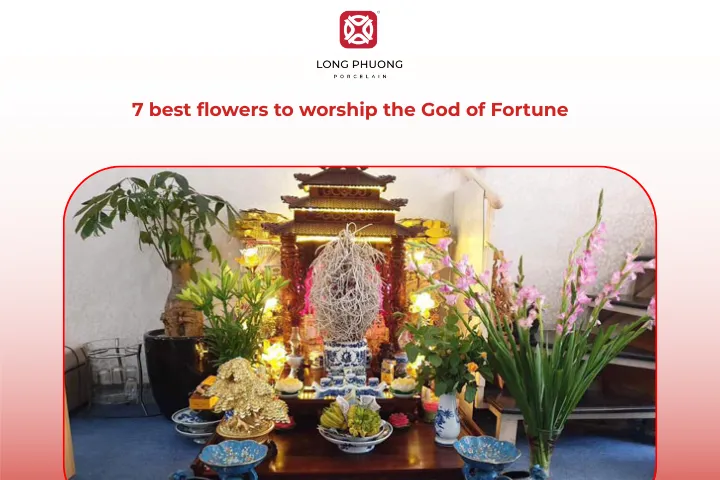
1. The meaning of flowers offered to the God of Fortune
Flowers have been part of spiritual practices for centuries, and for good reason. They’re fresh, fragrant, and naturally beautiful. These qualities represent purity and sincerity when offered to a deity. In many cultures, flowers are seen as a bridge between humans and the divine, carrying prayers and gratitude with their vibrant colors and gentle scent.
When worshiping the God of Fortune, flowers symbolize more than just devotion. Their natural energy is believed to invite prosperity, sweep away negativity, and create a sacred atmosphere. Just as a blooming flower signals new life, offering flowers to the God of Fortune reflects the hope for growth, success, and blessings in one’s home and business.
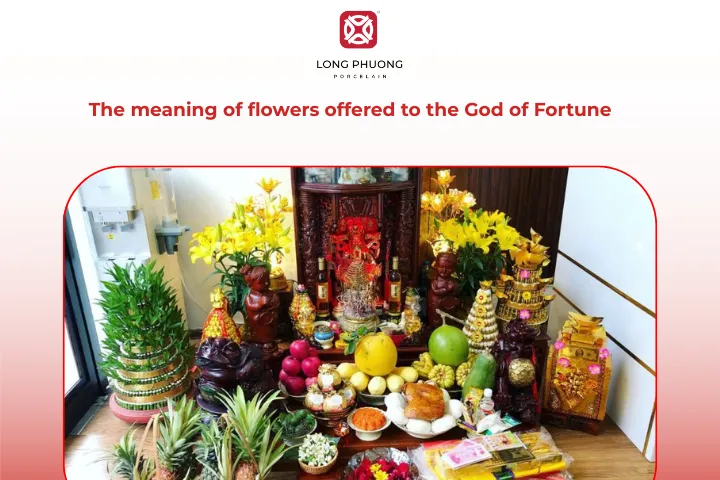
2. How to choose flowers to worship the God of Fortune
Choosing the right flowers to worship the God of Fortune is more than a simple decoration. It’s about aligning your intentions with the blessings you wish to receive. When preparing offerings for the God of Fortune, there are a few key points to keep in mind.
2.1. Freshness matters most
Always choose flowers to worship the God of Fortune that are freshly bloomed, vibrant, and free from blemishes. Fresh flowers are believed to carry pure energy, while wilted or dry ones may block positive blessings.

2.2. Pay attention to colors
Each color has a symbolic meaning in spiritual practice. Yellow and gold shades represent prosperity and wealth, red brings power and strength, while white reflects purity and sincerity. By choosing the right colors, you enhance the intention behind your offering.
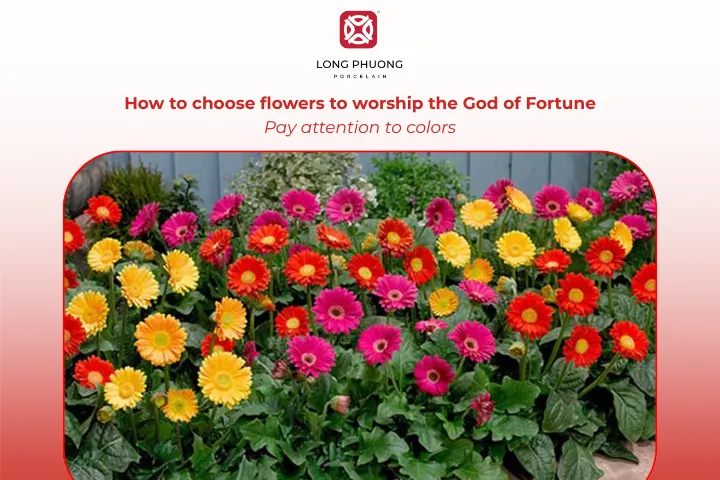
2.3. Consider fragrance
Flowers with a gentle fragrance are said to please the deities and uplift the worship space. Avoid flowers with an overpowering smell or those commonly associated with mourning, as they may disrupt the flow of positive energy.
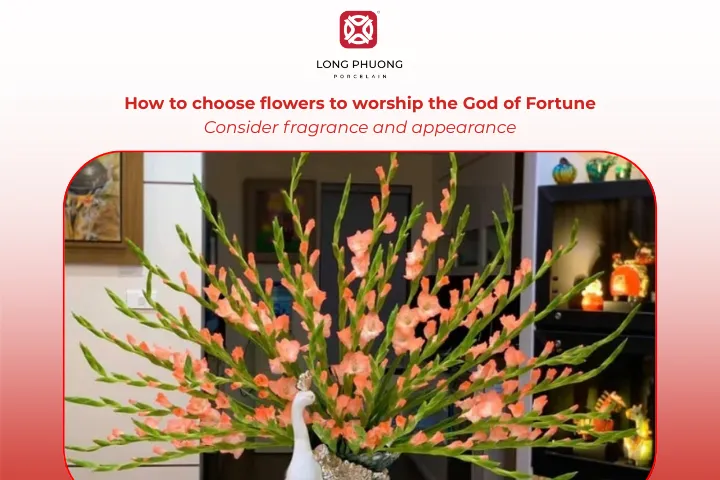
2.4. Match the setting
For daily home prayers, simple and modest flowers work well. For festivals or special rituals, larger arrangements or garlands are often preferred to mark the occasion with grandeur and devotion.
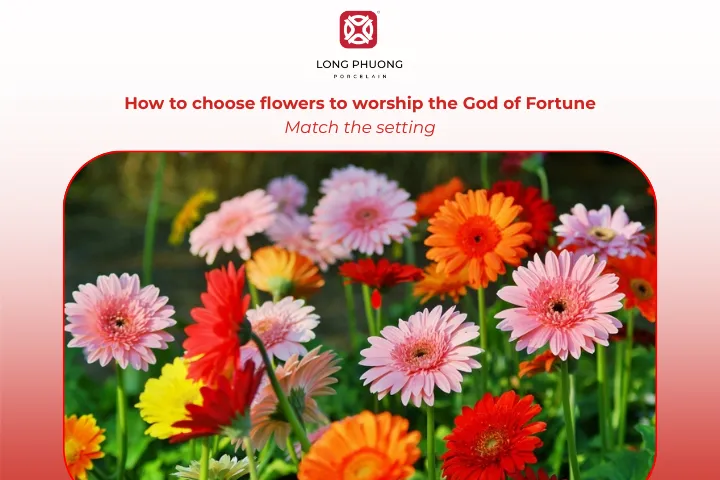
By keeping these guidelines in mind, your flower offerings become more than just a ritual. They transform into a meaningful gesture that opens the way for prosperity, peace, and abundance.
3. 7 best flowers for the God of Fortune worship
When it comes to choosing flowers to worship the God of Fortune, not all flowers carry the same meaning. Some are especially valued for their colors, fragrance, and symbolism of prosperity.
3.1. Gerbera
Gerbera is a popular choice during Lunar New Year celebrations because it symbolizes wealth and good fortune. Placing them on the God of Fortune’s altar is believed to attract prosperity, bring luck in business, and invite abundance into the home. At the same time, these vibrant flowers are thought to ward off negativity and usher in positive energy for the family.
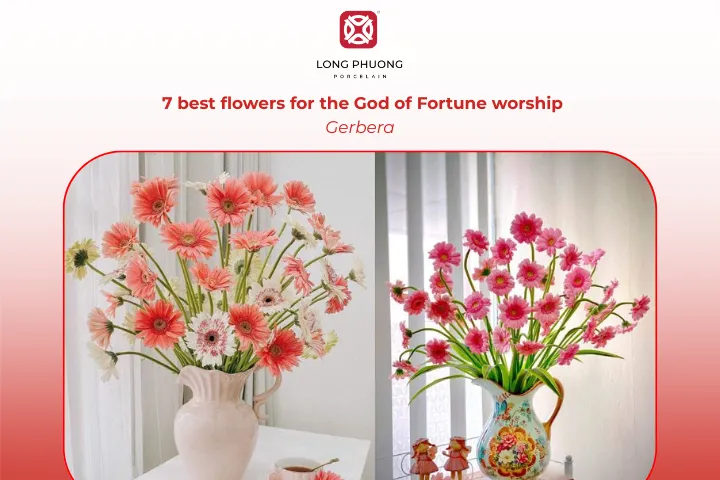
3.2. Yellow daisy
Yellow daisies are often seen as a symbol of nobility and prosperity. Placing them on the God of Fortune’s altar carries the wish for wealth and abundance. Their golden color represents luck, fullness, and protection from negativity, which is why they’re especially popular during important holidays and New Year celebrations. A bright bouquet of yellow daisies is believed to invite positive energy, drive away misfortune, and keep the household’s fortune flowing smoothly.
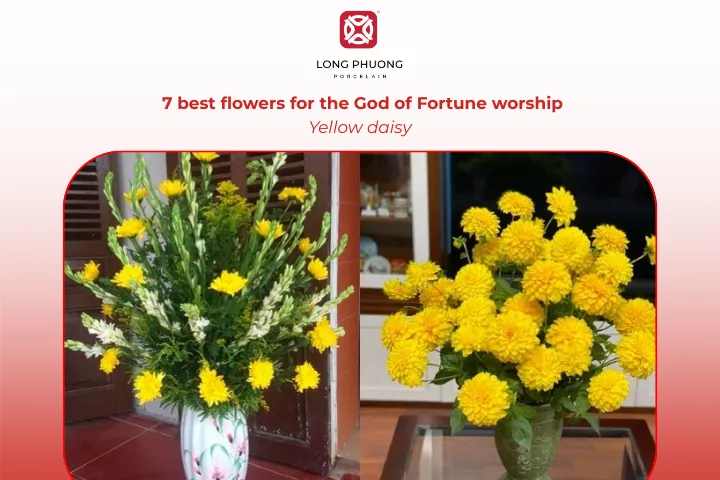
3.3. Red rose
Roses are a timeless favorite, not just for their beauty but also for their gentle fragrance that makes them perfect for placing on the altar. In feng shui, red is a color that symbolizes luck. That’s why red roses hold a special meaning when offered to the God of Fortune. They’re believed to invite blessings of wealth, help a family’s business thrive, and bring positive energy into the home.
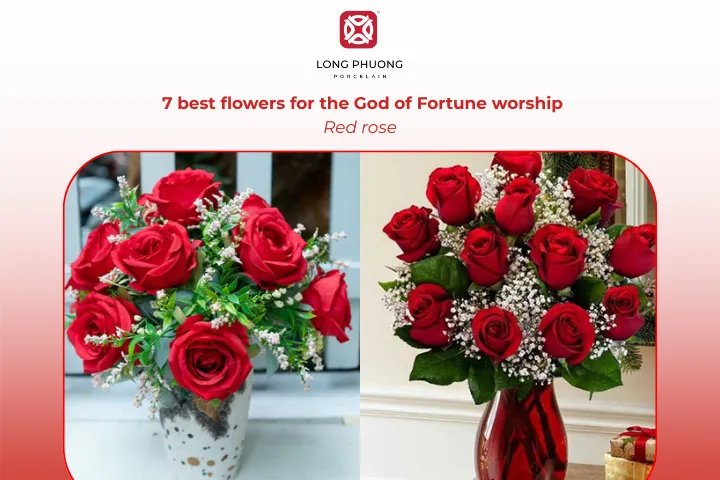
3.4. Gladiolus
Gladiolus is a common choice in Vietnamese homes for offerings on the ancestral altar as well as the God of Fortune’s altar. This flower carries a deep meaning of purity, elegance, and grace, making it especially fitting for spiritual offerings. Gladiolus has a gentle, subtle fragrance that lingers softly in the air.
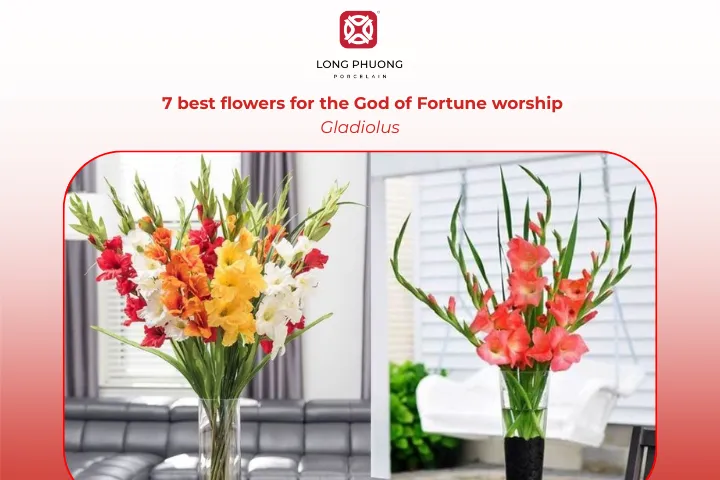
3.5. Daffodil
Daffodils symbolize good luck and longevity. In Eastern culture, they are seen as a sign of peace and positivity. With their gentle beauty, graceful presence, and auspicious meaning, narcissus blossoms bring blessings to the household. Their warm colors also make them a perfect choice for placing on the sacred altar.
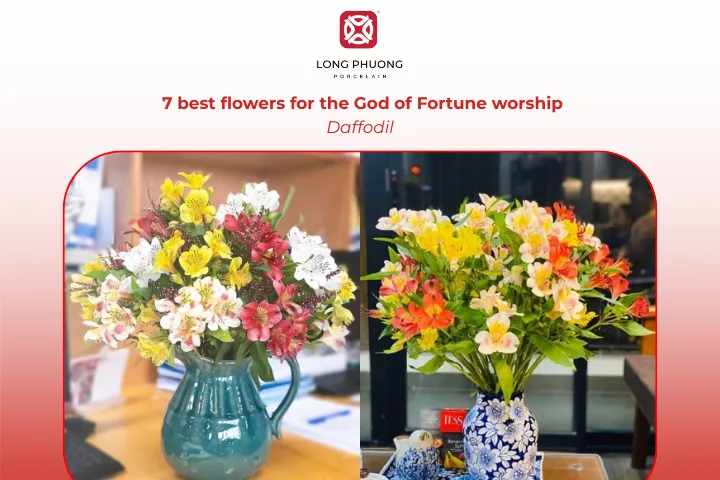
3.6. Peony
Peony is also commonly used as offerings on ancestral and Buddhist altars, as well as in sacred spaces of worship. This flower symbolizes luck, prosperity, and abundance. That’s why placing peonies on the God of Fortune’s altar is believed to bring the family wealth, happiness, and lasting good fortune.
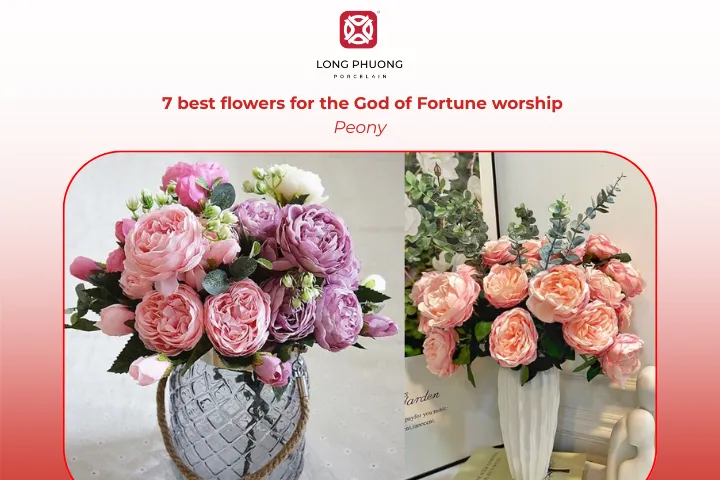
3.7. Lotus
Lotus is a sacred flower across many cultures, representing purity, rebirth, and spiritual awakening. Despite growing in muddy water, it rises clean and beautiful, symbolizing victory over challenges. Offering lotus to the God of Fortune isn’t just about material wealth. It’s also about seeking inner balance and clarity. Many people believe the lotus helps attract holistic prosperity that nurtures both the soul and the wallet.
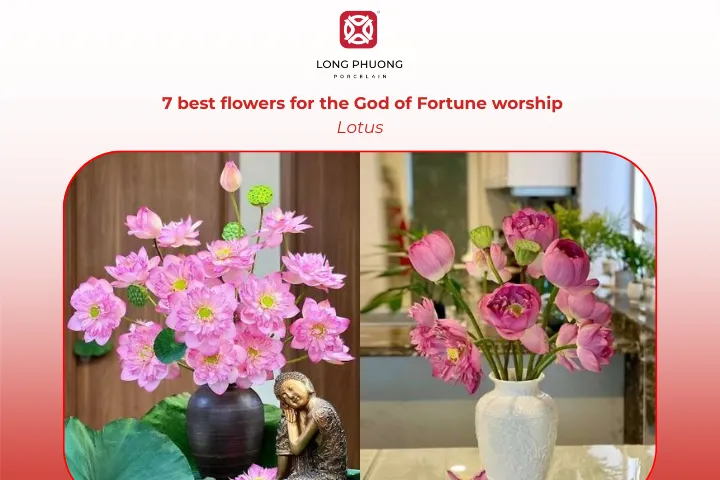
4. 5 flowers to avoid for God of Fortune worship
While many flowers attract prosperity and blessings, some are considered inappropriate or unlucky when offered to the God of Fortune. Choosing the wrong flowers to worship the God of Fortune can weaken the spiritual energy of your altar, so it’s important to know what to avoid.
4.1. Lily
Lilies, though elegant and fragrant, are not often chosen for worship during Lunar New Year or other festive occasions. In Vietnamese, the name of the flower is linked to the idea of separation or parting, which carries an inauspicious meaning when it comes to offerings. Because of this, lilies are generally avoided on the God of Fortune’s altar.
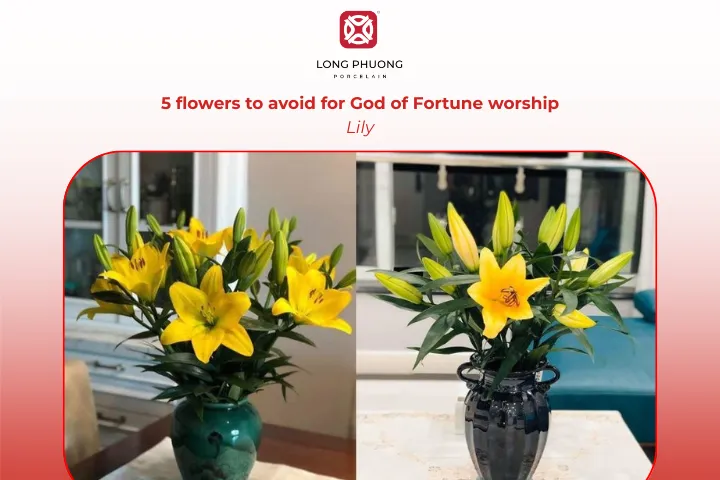
4.2. Chrysanthemums
Chrysanthemums, while vibrant and eye-catching, have a strong scent and are traditionally associated with honoring the departed. Because of this connection, they often evoke a somber or heavy feeling rather than the uplifting energy that’s desired for the God of Fortune’s altar.
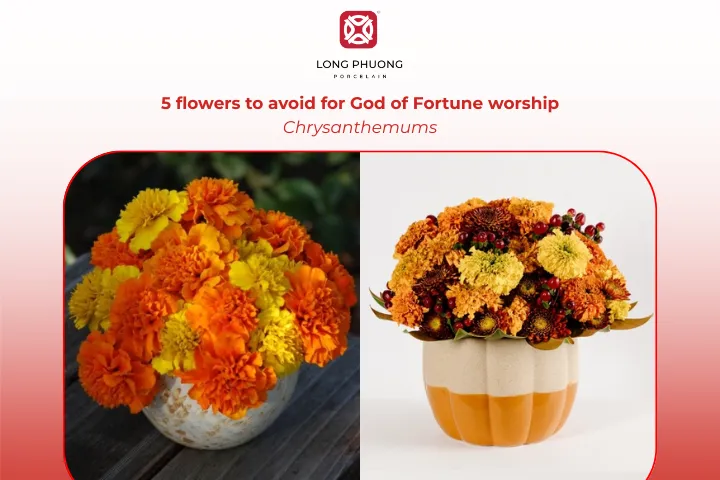
4.3. Hibiscus
Hibiscuses are usually avoided when decorating the God of Fortune’s altar. While they may look bright and cheerful, their names in Vietnamese carry meanings that are considered inappropriate for worship. Because the altar is seen as a sacred space meant to attract prosperity and positive energy, families often prefer flowers with more uplifting symbolism.
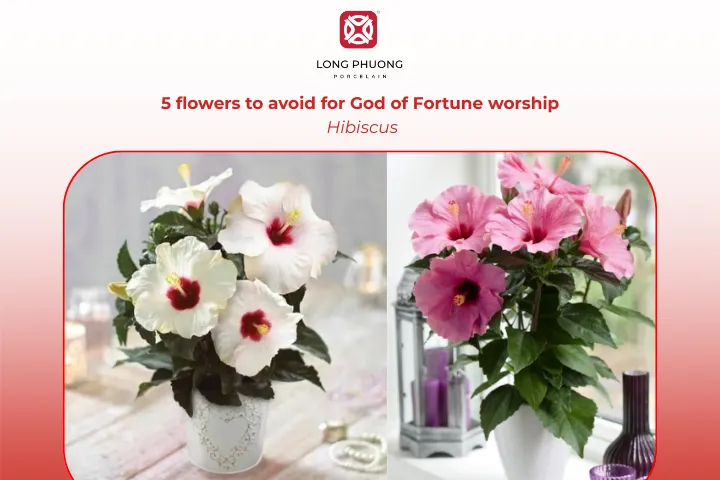
4.4. Orchids
Orchids (also called “phong ly” in Vietnamese) are admired for their beauty, elegance, and delicate charm. But according to Vietnamese folk beliefs, the word ‘Phong’ can be associated with meanings that aren’t considered suitable for sacred offerings. Because of this, orchids are usually avoided when decorating the God of Fortune’s altar.
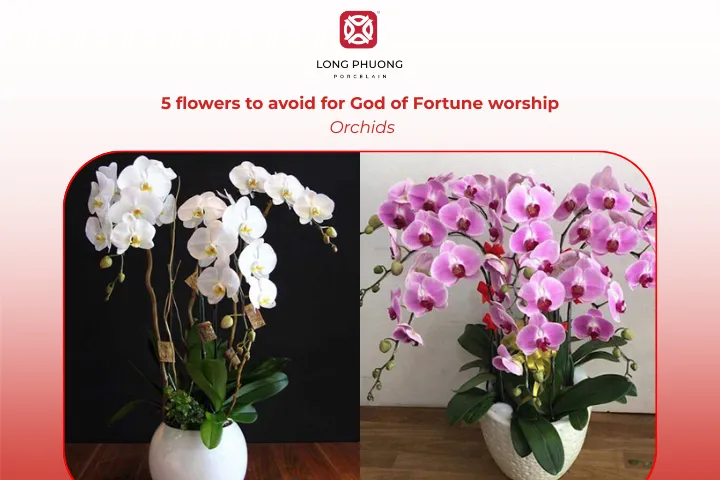
4.5. Jasmine
Jasmine is well-loved for its sweet fragrance and its symbolism of purity and innocence. However, in Vietnamese folklore, the flower is linked to an old story with negative connotations. Because of this, jasmine is generally avoided on the God of Fortune’s altar.
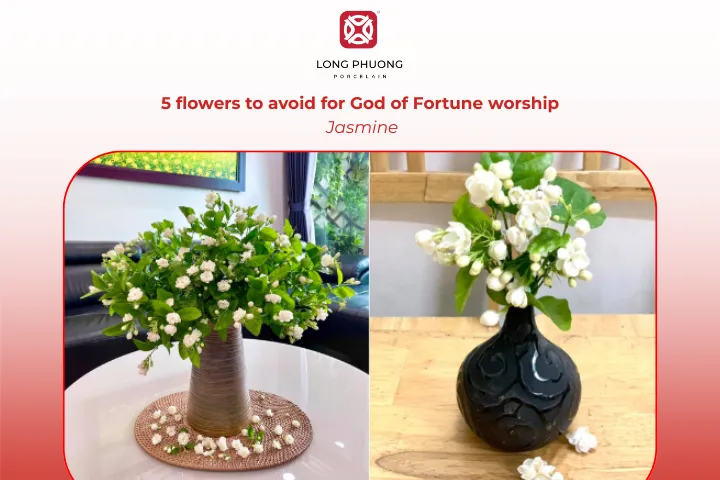
5. Key notes for God of Fortune worship
When worshiping the God of Fortune, small details can make a big difference in the effectiveness and respectfulness of your ritual. Paying attention to key points ensures your devotion is sincere and your prayers are more likely to be received positively.
5.1. Cleaning the God of Fortune statue when bringing it home
To invite the best flow of wealth energy, boil pomelo leaves, soak a soft cloth in the water, and gently wipe the statue. The God of Fortune’s statue should remain clean throughout the worship process, so regular cleaning is essential. Be sure to use a cloth reserved solely for this purpose and never for anything else.
Placing a statue on the altar without properly cleaning it first can allow dust and dirt to accumulate, which may significantly diminish the sacredness of the altar and prevent the worship from bringing the intended blessings to the household.
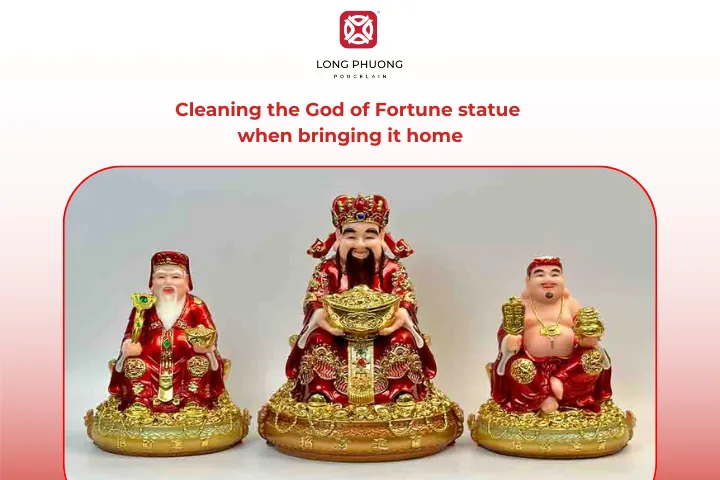
5.2. Cleaning the God of Fortune altar regularly at specific times
Along with the God of Fortune’s statue, the God of Fortune’s altar is an area that should be cleaned regularly at specific times. Traditionally, pomelo-infused water is used to wipe down the altar, as it’s believed to purify the space and dispel negative energy according to spiritual practice.
It’s especially recommended to clean the God of Fortune’s altar on the 10th day of the Lunar New Year, the 14th day of each lunar month, and at the end of the month to keep it sacred and spotless.
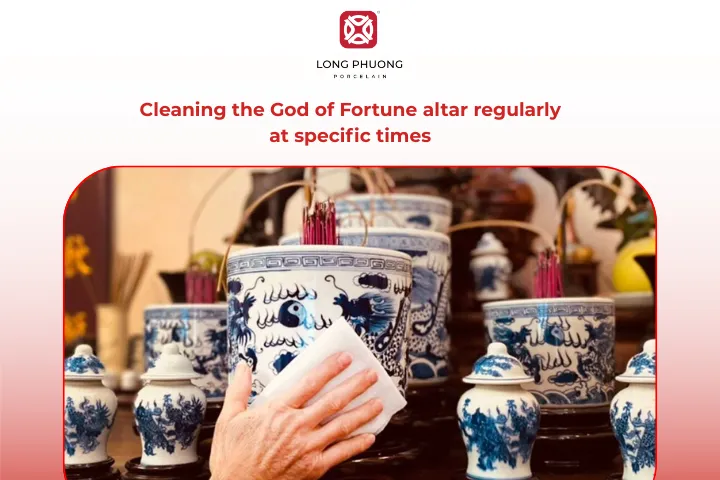
5.3. Gather energy for the God of Fortune’s altar in the first 100 days
During the first 100 days, change the water daily and light one incense stick each day. On important lunar calendar days, such as the first day of the month or the full moon, arrange five incense sticks in a cross shape. If you are praying for a specific wish, place three sticks in a straight line.
On the 23rd day of the 12th lunar month, the energy-gathering process comes to an end. You can then remove the incense sticks and burn them along with paper money. Finally, pour a little rice wine over the ashes to complete the energy-gathering ritual.
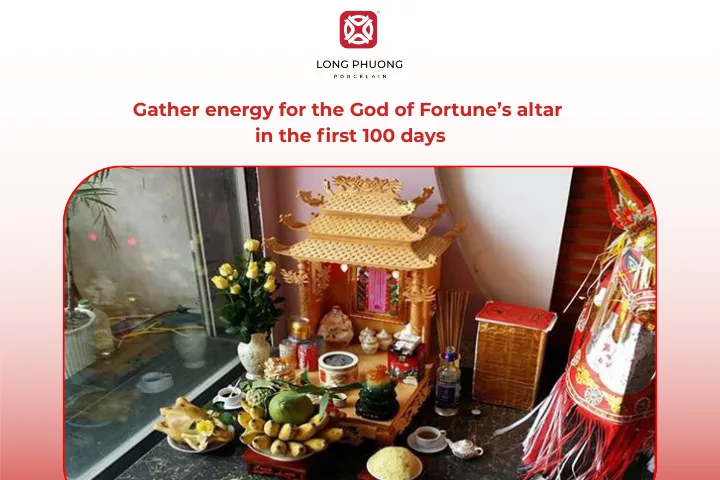
5.4. Limit placing withered flowers or weak leaves on the altar
It’s important not to leave wilted flowers or yellowing leaves on the God of Fortune’s altar. In spiritual tradition, decaying plants are thought to attract negative energy, which can bring misfortune and block the flow of prosperity. Keeping the altar fresh and vibrant not only honors the God of Fortune but also helps maintain positive energy, supporting good luck and success in business.
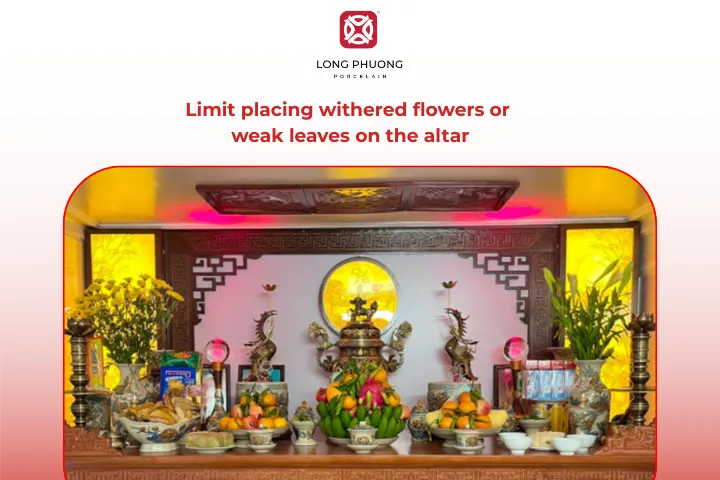
5.5. Change the water in the flowerpot regularly
It’s important to change the water in your flower vases regularly. Stagnant water can create unpleasant odors and may diminish the sense of sacredness at the God of Fortune’s altar. By keeping the water fresh, you not only maintain the altar’s serene and dignified appearance but also help invite positive energy and prosperity into your home. Regular care of the flowers is a simple yet meaningful way to honor the deities and keep the altar vibrant and auspicious.

5.6. Avoid using artificial flowers or plastic items on the altar
While artificial flowers and plastic decorations may seem convenient, they lack the natural energy that fresh, living flowers carry. Offering artificial flowers to worship the God of Fortune can reduce the spiritual effectiveness of your ritual and may be seen as less sincere. For the God of Fortune, always prioritize real flowers and natural materials to ensure your altar radiates purity, respect, and positive energy.
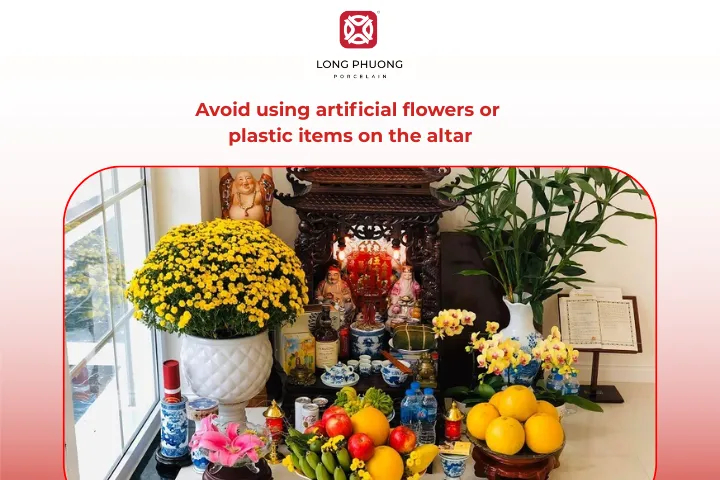
5.7. Avoid praying to the God of Fortune for unlawful or unethical things
When making prayers, your intentions matter as much as your devotion. Asking for wealth or success through unethical or illegal means can backfire, blocking positive energy instead of attracting it. The God of Fortune favors sincerity, honesty, and good karma. Focus on legitimate goals and blessings that benefit not only yourself but also those around you, ensuring your offerings carry pure and respectful intentions.
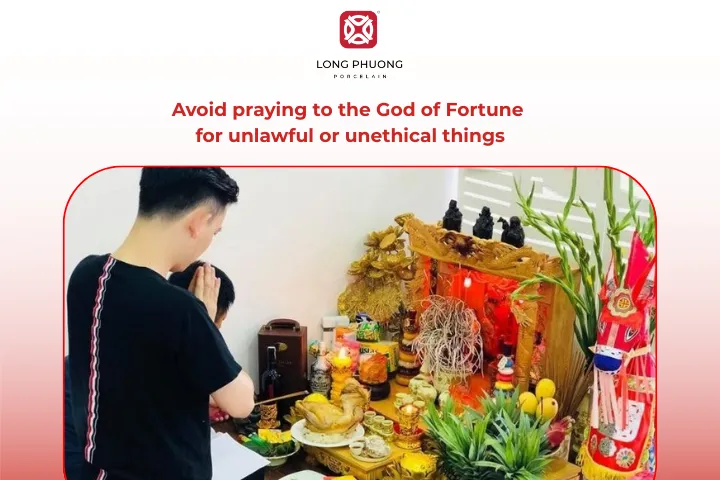
6. Reasonable day and time to invite the God of Fortune
When worshiping the God of Fortune, choosing the right day and time is important. Here are some auspicious time frames to invite the deities:
- 5–7 AM and 5–7 PM: These hours are considered very lucky, often aligned with the southwest direction. They are believed to bring peace to the home and safety for those traveling.
- 9–10 AM and 9–10 PM: Inviting the deities during these hours is thought to bring blessings, happiness, and good fortune.
- 1–3 AM and 1–3 PM: Worshiping during this period is believed to support prosperity in business, smooth progress, and favorable outcomes for the family.
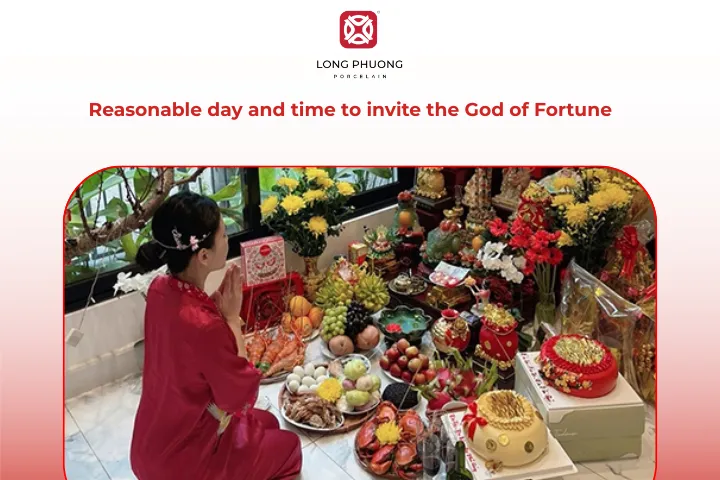
7. How to arrange flowers to worship the God of Fortune
It’s ideal to place nine flowers to worship the God of Fortune. In traditional feng shui, odd numbers are considered lucky, and nine is the largest odd number. It symbolizes growth, completeness, abundance, and even longevity and eternity. If your vase or altar is smaller, five or seven flowers are also acceptable. Avoid using an even number of flowers, like 2, 4, 6, 8, or 10, as these are traditionally seen as unlucky and inauspicious.
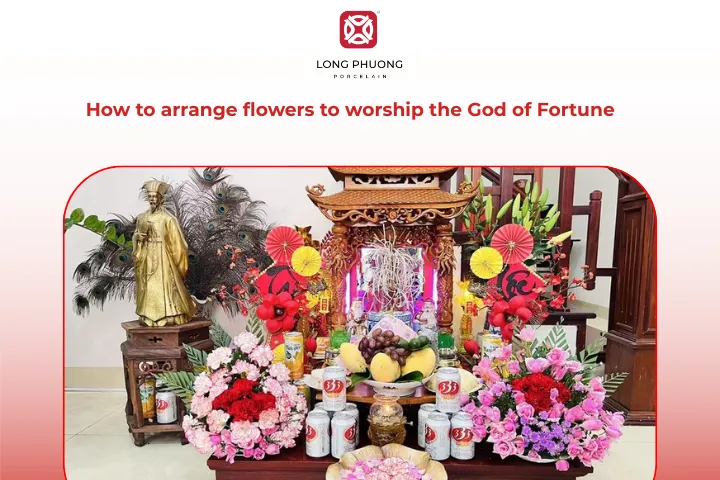
8. How to position the God of Fortune’s altar and flower vase
The God of Fortune’s altar should ideally face the North, South, East, or Southeast. For male homeowners with a West-facing fortune, the altar is best oriented toward the West, Southwest, Northwest, or Northeast. For female homeowners with an East-facing fortune, positioning the altar toward the North, South, East, or Southeast is considered most auspicious.
Use a vase made of porcelain or green stone and place it on the right side of the altar. If your God of Fortune’s altar faces the main entrance to the South, place the vase on the left side (East). This way, when the East or Southeast wind blows in, the fragrance of the flowers will fill the room. Fruit plates should be placed on the right side (West), making it easy to arrange and display offerings for the deities.
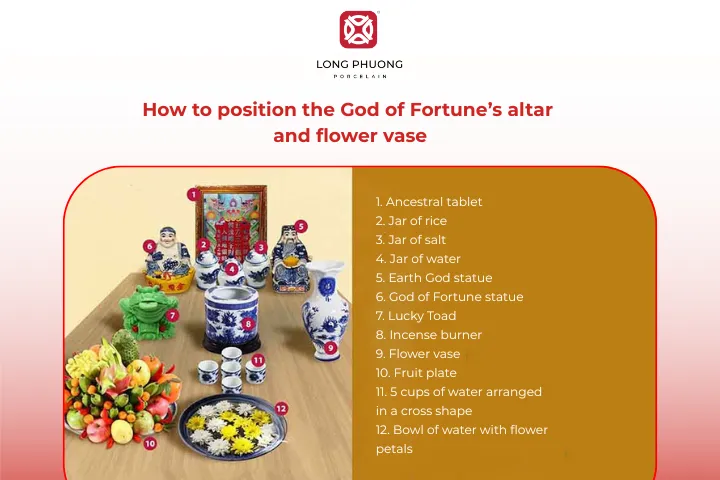
See more: Kim Lai Porcelain Vases 5”- 8” -12”
9. Long Phuong Porcelain – A trusted supplier of porcelain flower vases
Choosing the right vase can enhance both the beauty and spiritual energy of your flower offerings. Long Phuong Porcelain is renowned for producing high-quality porcelain vases that combine elegance with durability, making them ideal for worship rituals.
These vases are crafted with attention to detail, ensuring smooth surfaces, balanced shapes, and vibrant glazes that complement any flower arrangement. Whether you prefer traditional designs or modern styles, Long Phuong offers a wide range of options. With over 22 years of experience in porcelain, we are committed to bringing you high-quality products and exceptional service.
Using a quality porcelain vase not only keeps your flowers fresh longer but also adds a touch of refinement to your worship space. By pairing meaningful flowers with a carefully chosen vase, your offerings become more visually appealing and spiritually effective.
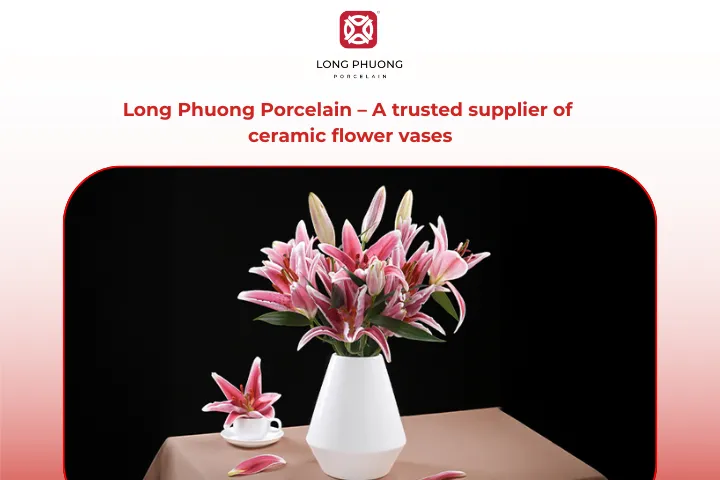
10. FAQs
10. 1. How often should I change worship flowers?
Freshness is essential when choosing flowers to worship the God of Fortune. Ideally, flowers should be replaced daily or at least twice a week. Regularly changing them shows respect, maintains the altar’s positive energy, and ensures your offerings continue to attract prosperity and blessings.
10.2. Can I use artificial flowers to worship the God of Fortune?
Artificial flowers should not be offered on the altar. They lack the natural energy and life force that real flowers carry and are considered disrespectful in rituals. Only fresh, natural flowers should be used when choosing flowers to worship the God of Fortune, ensuring your offerings are sincere, pure, and spiritually effective.
10.3. When to offer flowers to the God of Fortune?
Flowers can be offered daily, during important festivals, or on special occasions like business openings. Early morning is often considered the most auspicious time, as the fresh energy of the day enhances the power of your prayers and offerings.
10.4. Should I recite a prayer when offering flowers?
Reciting a prayer is highly recommended as it strengthens your intention. A simple, sincere prayer asking for prosperity, health, and harmony can make your offering more powerful. Even a few words spoken from the heart are enough to enhance the spiritual connection with the God of Fortune.
11. Conclusion
Flowers are more than just decorative items. They are a bridge between your heart and the divine. Choosing the right flowers to worship the God of Fortune reflects sincerity, respect, and a genuine desire for prosperity. It’s not just the God of Fortune’s altar that requires careful selection of offerings. Ancestral altars, Buddhist altars, and other sacred spaces should also be approached thoughtfully. The tips above are shared with the hope of providing you with useful knowledge about 7 best flowers to worship the God of Fortune for your home and altar practices.
CEO of Long Phuong Group Joint Stock Company, with more than 20 years of exploration and research to obtain the best formulas and professional experience, Long Phuong Porcelain has produced more than 400 designs of all kinds of household porcelain, Significant contributions to Vietnam's ceramic industry.
 Vietnam
Vietnam
